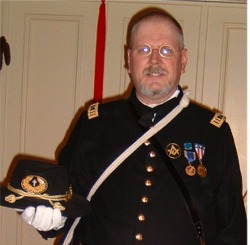

|
The
Chaplains of the 9th PA Reserves, Company A are Chaplains Larry D. French, Sr. and John Leggett. Larry just recently joined the 9th Pennsylvania with an interest in the Civil War and Chaplaincy. He works as a computer specialist when not portraying a chaplain in the Ninth.
The ninth as a whole is made up of a diverse group, from all religions, denominations, and faiths, with varying degrees of
intensity. Therefore, we as a group, try not to officially associate with a specific church or religion. All invocations or prayers conducted for a moment of silence or memorial service are generally kept as generic as
possible so as not to offend someone who may not share a specific belief. Larry has been a certified legally ordained minister of the Universal Life Church Online since August 2000. He portrays a Scot-Irish Chaplain, observant to the spiritual needs and morale of his unit, but keeping in mind the religious diversity that exists in the unit. To learn more about Chaplain French's abilities and qualifications, Click Here.
Chaplain McFarland,
Chaplain Jas. W. McFarland mustered into service on 10 Aug 1862 and mustered out by General Order, 6 Oct 1862. He enlisted for a 3 year term. I gathered from his name that he was of Scot-Irish descent.   |
rev. 14 November 2009
|
Army chaplains in the Civil War were considered officers and therefore relatively well paid - $80 per month in the Confederacy and $100 per month in the Union. In the Confederate Army, chaplains were for the most part elected by the soldiers of a regiment, and commissioned by President Jefferson Davis. Federal Army chaplains were chosen by the officers of a regiment or appointed by the state governor. The primary duty of a chaplain was consoling the troubled, the sick and wounded, and those facing death. In addition, he often ran a camp library, wrote and read letters for the illiterate, and frequently took charge of the mail for the regiment. Later in the war they were assigned to army hospitals. The soldiers had no time for chaplains who proved battle shy, or for those who were unable, or unwilling to withstand the hardships of camp life. The common soldier, as well as the officers, were just as quick to give their approval of chaplains who proved their physical courage and devotion to duty. Honesty, sympathy, warm-heartedness and a dedication to spiritual matters were regarded as essential traits. Successful civilian clergymen were hesitant to give up their positions for the risks and low income of army life. Many of the chaplains who did serve had been unable to find churches. Many joined for the money. The majority of mid-nineteenth century Americans were Protestant with a strong tendency towards evangelical denominations, such as Baptist, Presbyterian and Methodist. Units from large cities in the north had Jewish soldiers in the ranks. Many of the Italian, French,and Irish soldiers were Catholic, and many Germans in the armies were "free- thinkers" who scoffed at orthodox religions. Spiritual revival swept through the Confederate Army in 1863. Many Confederates believed the defeats that summer in Gettysburg and Vicksburg were a judgment of God, and they determined to pray even harder and try for greater righteousness. The revival spread from the Atlantic to the Mississippi and reached more than 100,000 souls. Sources:
Tenting Tonight:The Soldier's Life by James I. Roberston Jr. & Time-Life |
|
Chaplain Web Sites and other links
Chaplains' Camp Chest |
Thank you for visiting my page at Angelfire.
Please come back and visit again! |








On The Set Of The Movie Dog Jack (above)



